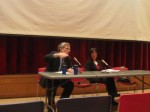New Castle Panel Links Carbon Emissions to Climate Change

The increasing frequency of severe weather events topped three months ago by Hurricane Sandy is largely the result of climate change caused by rising carbon emissions.
That was the conclusion offered by two expert speakers at a Jan. 16 League of Women Voters of New Castle forum at the Chappaqua Public Library. Environmental attorney Michael Gerrard, director of the Center of Climate Change Law, and Robi Schlaff, who co-chaired a steering committee for the state’s Sea Level Rise Task Force, were featured during the 90-minute event. Both speakers are town residents.
Gerrard said that the “trend is unmistakable” between increasing carbon emissions in the atmosphere and the spiraling average temperatures seen throughout the United States and most places around the world. If the current trend continues, the average temperature could increase by as much as 15 degrees by the end of the 21st century, according to a report by the U.S. Global Change Research Program, he said.
“The CO2 levels in the atmosphere are higher now than at any point in at least 800,000 years,” Gerrard said.
As a result of the increasing average temperatures–last year was the hottest on record for the continental United States–there will continue to be greater weather extremes, he said. Spells of severe drought will be seen in some areas while other locations will continue to experience unusual storms and exceedingly wet weather.
Warmer temperatures have already caused sea levels to rise by four to six inches in the past 50 years, Schlaff said. The Sea Level Rise Task force, which issued a report at the end of 2010, had correctly predicted what would happen to lower Manhattan in a hurricane. However, the fact that forecasts of flooded subways and tunnels came true less than two years after the group completed its work caught many observers by surprise, she said.
“The impacts were not surprising but none of us expected that these predictions would come so soon,” Schlaff said.
As coastlines change, municipalities will be watched closely to see whether residents who experienced the heartache of lost homes and damaged property will be allowed to rebuild in the same locations, she said. Schlaff expects Hurricane Sandy’s final costs to reach $100 billion.
“I think it’s my hope that this will change, that Hurricane Sandy is a sea change and that we’ll try to get some legislation in place to protect us all,” she said.
Meanwhile, the United States’ inaction in addressing carbon emissions and climate change legislatively has been a glaring omission on the world stage, Gerrard said. There has been no new significant legislation that has been passed by Congress in more than 20 years, when the last amendment to the 1970 Clean Air Act was approved. Since then, the United States has been the only industrialized nation in the world that has failed to support the Kyoto Protocol, a United Nations agreement that commits to reducing greenhouse gas emissions, he said.
Gerrard said political forces in the United States along with social attitudes and even some religious beliefs have prevented the country from taking climate change more seriously.
However, the scientific community is nearly all in agreement that there is a direct correlation between carbon emissions and climate change, Gerrard said.
Despite the sobering news, Gerrard said that energy conservation can have the largest impact on preserving the environment and it’s the most economical approach as well.
The moderator for the last week’s forum, former town supervisor Barbara Gerrard, Michael Gerrard’s wife, said that New Castle is one of the leaders in limiting greenhouse gases. New Castle became the first municipality in New York State to become a Climate Smart Community, an effort that focuses on reducing carbon emissions, she said.

Martin has more than 30 years experience covering local news in Westchester and Putnam counties, including a frequent focus on zoning and planning issues. He has been editor-in-chief of The Examiner since its inception in 2007. Read more from Martin’s editor-author bio here. Read Martin’s archived work here: https://www.theexaminernews.com/author/martin-wilbur2007/
